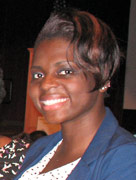Progressive Scholars Bring New Cultures and Perspectives to Campus
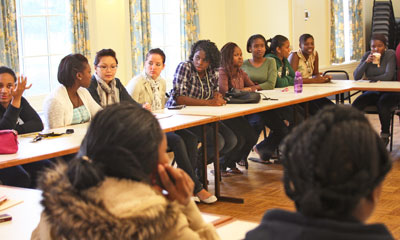
Colby-Sawyer College's stately campus, sitting high on a windy hill in New Hampshire with sweeping views of nearby mountains, woods and lakes, has long been one of the college's greatest assets. Historically, the college has drawn students from rural and suburban New England towns who come for a visit and immediately feel at home here.
But as communication technologies connect the planet, and business and industry become more globalized, small colleges like Colby- Sawyer are seeking to create more diversity that better reflects—and prepares its graduates for—a changing world. So, how does a rural college with a homogeneous student population like Colby-Sawyer's reach beyond its traditional territories to attract students who live in major cities across the nation—students of diverse backgrounds whose perspectives, religion, ethnicity or race differ from the majority of its current students?
This very question sparked a lively brainstorming session over lunch between President Tom Galligan and Vice President for Enrollment Management Greg Matthews in January 2008. The two college leaders discussed national models such as the Posse Program, which helps colleges recruit connected groups or cohorts of promising students who belong to populations that are traditionally underrepresented in higher education. The program prepares them for college, and once they arrive as cohorts on campuses, they offer each other built-in support systems that guide them through difficult transitions and on to graduate at a rate of 90 percent.
While President Galligan and Vice President Matthews liked the cohort concept behind the Posse Program, they felt it would be too costly for Colby-Sawyer. So they tossed around ideas for raising the ethnic, racial and geographic diversity of the student body well beyond Colby-Sawyer's typically small 3 to 5 percent range. Ultimately, the two college leaders agreed the college should create its own version of a Posse Program through partnerships with urban high schools.
At that point Admissions snapped into action. The staff identified two Boston area high schools they had worked with—Cambridge Rindge Latin School and Malden High School—as having extremely diverse student populations, including many multicultural, first-generation Americans, and solid college preparatory programs for their academically strong students. Between mid- January and April 2008, the staff, led by Jen Jacques, senior associate director of Admissions and director of International and Diversity Recruitment, visited the schools, met with guidance counselors and principals, and brought prospective students to Colby-Sawyer for interviews and campus tours. By the end of April, 20 students from the two high schools had applied for admission as part of a new full-scholarship program called Progressive Scholars. That fall the first class of scholars arrived on campus for their first year of college.
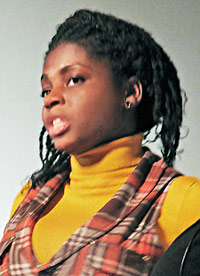
Finding their Way
Bernadine Bernard chose Colby-Sawyer over other schools she liked because she felt honored to be chosen as a Progressive Scholar. “I felt I was being recognized for my hard work and for who I am,” she says. Born in Haiti, Bernadine moved to Cambridge, Mass., with her parents and five siblings as a child. She attended private schools until her junior year, when she transferred to Malden High School. Soon after her arrival, Bernadine ran for class president; she lost, but gained attention and respect from her classmates and teachers. She earned good grades and took on leadership roles such as an appointment to the Boston Student Advisory Council, which worked with the Massachusetts Department of Education to review policies at the city's schools and advocate for students.
“I helped to change polices that banned students' cell phones and locked students out if they didn't arrive at school by 7:45 a.m.,” she says.
Raised by her parents to be independent, disciplined and accomplished, Bernadine brought high aspirations for herself and the Progressive Scholar Program to Colby-Sawyer. During an “ice breaker” at Student Orientation, she told her group, half-joking, that she would one day “rule the world” and, in fact, she plans to earn a B.A. in business, followed by an M.B.A. and law degree.
Bernadine and the other scholars knew they were the pioneers of a new and untested program, knew they would stand out as different and have to adapt to a lifestyle without public transportation, malls or movie theaters around the corner. So when the culture shock hit, Bernadine was ready for it.
“There were students who had never met a black person,” she recalls. “They had all these assumptions, such as we got the scholarships just for being black. But it was only a handful of people, and I knew that, as the first Progressive Scholars, we had to change their perspectives and make a good impression. I told them 'This is not just a free way to go to college: We are trying to diversify the campus.'”
In those first few months, Bernadine chose to sit down and introduce herself to students she didn't know rather than join her fellow scholars from Malden and Cambridge for meals in the dining hall. She also opted against rooming with anyone from her high school. “They are like my family, but I'd tell them, 'You guys have to branch out, pull away from the group. It's good for us to get to know others.'”
While the pilot program was intentionally unstructured, each scholar was assigned a faculty mentor in addition to an academic advisor, and they met regularly as a group with Jen Jacques, whose role in Admissions was expanded to include support for the program. “We wanted students to actively shape what the program would become,” says Vice President Matthews. “We limited how much we proscribed to them.”
In their first year, the Progressive Scholars faced challenges that all first-year students confront: overcoming homesickness, adjusting to the academic rigor of college, and adapting to new levels of independence. On top of this, many of them carried the weight of high expectations as first-generation college students and the first class of Progressive Scholars, along with added pressures of living in a rural area within a community of people who neither looked nor thought like they did. Yet the students proved remarkably resilient and resourceful; they connected to the community, joining clubs and teams, made friends and reached out for help when they needed it.
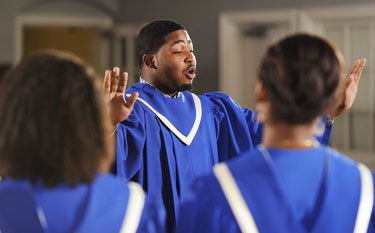
“It was definitely a trial year and they rolled with it pretty well,” says Jen. “They loved that this is their program and they have a chance to make their mark, but it was a daunting task. They had to create this program from the ground up, and that's the beauty and the crux of it. They're still figuring out what the goals and mission for the program will be.”
By year's end, the Progressive Scholars were taking ownership of their program and playing an active role in bringing in the next class. They hosted overnight visits in their residence halls and led campus tours for the next crop of prospective scholars, connecting online and in person to share their first-year experiences and encourage them to apply.
Making it Happen
For the 2009–2010 academic year, Admissions expanded the program beyond its pilot status by adding partnerships with a high school in Chicago and the Summer Search program in San Francisco and New York City. Building on their predecessors' foundation, the second class of Progressive Scholars burst out of the gates with natural ease and confidence. Within months they had created a gospel choir and begun planning a Black History Month event, and following the earthquake in Haiti, they organized a benefit dinner for the devastated country.
Like typical siblings, the first and second classes bonded and butted heads, with the former pushing for order and structure and the latter dashing off and dancing in the aisle.
“It was like night and day. The second class came in so much more independent and eager and hungry,” Jen recalls. “They're go getting and taking a higher level of initiative, starting clubs and running community service projects. This doesn't diminish the efforts of the first class, who had to be the pioneers, the brave ones who came in and established the program without the benefit of an older class to show them the way. As sophomores, the first class took the newcomers under their wings, especially those from their own schools, and made the adjustment easier for them.
“Now it's a blended program; the two classes balance one another and a symbiotic relationship has been created. They push and challenge one another, support and complement,” she adds. “It's empowering to see the chemistry of the group.”
The second class includes six Progressive Scholars from North Lawndale College Prep, a charter high school in Chicago that prepares students from economically challenged families for college. All of these students, including Crystal Adams, Jasmine Holman and Robert Stuart, arrived at Colby-Sawyer with strong academic records, leadership experience and a desire to give back to their communities. They were raised in strong, closely knit families, and Colby-Sawyer's small campus and friendly community appealed to them.
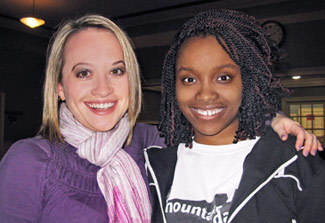
Crystal is a petite and fun-loving woman whose small size and broad smile can initially mask a determined, take-charge personality. She was offered scholarships at colleges and universities in her home state of Illinois, but Crystal wanted to proclaim her independence by studying far from home. She was also touched by a personal visit from Vice President Greg Matthews and Jen Jacques to her high school.
“They came here to see how it is to be a student of color in the city,” she says. “They don't want me just to bring up their numbers; they came to see where I'm from.”
When, on the day of the event, Crystal heard that Admissions needed a tour leader for a Progressive Scholars Visit Day, she rushed over to Jen Jacques' office to offer her service. Although she had no formal training, Crystal led 35 administrators from the Boston area schools on a tour of campus, even walking backwards in true collegiate tour guide style.
“She was fearless and confident,” Jen says. “I've never seen a first-year student do something like that. She got great feedback and will be a tour guide for us next year in an official capacity.”
Like many first-year students, even those who were high achievers in high school, Crystal, Jasmine and Robert had to learn to manage their time better and strengthen their study skills. They found it hard initially to balance their academic studies with their busy social lives and the growing demands of co-curricular activities. The many hours they devoted each week to practice and performances for the new gospel choir, Voices of CSC, stole time from their studies. The wake-up call was delivered by their first-semester grade reports.
Jasmine, who intends to major in Child Development and minor in Creative Writing, buckled down in the spring semester and made the Dean's List. She attributes her turnaround to hard work and discipline, along with steady support from her cohort and a long list of faculty and staff members.
“Everyone listens to me and seems to really care,” says Jasmine. “The faculty gave me a lot of encouragement on my work, and they and my advisor and Jen helped me deal with my personal problems like homesickness. To be honest, I don't think I could have done it without them.”

Learning from Each Other
Robert describes his first semester of college as an “eye-opener” both for him and the community he now belongs to. He plans to major in Communication Studies and has especially enjoyed his classes in philosophy and the deep conversations that occur in the classroom. He feels free to share his perspectives on issues, including race, and he has found that open discussion can bring clarity to his own and others' misconceptions.
“Some people think we don't have fathers in our households, but we do. And I was thinking that if you were white, you had someone rich in your family who was helping you out, but that's not the case,” he says. “We're sharing our thoughts and experiences and people are very open and accepting.”
Tall and sleepy-eyed, Robert describes himself as “talkative, opinionated, helpful and polite” and as someone to whom others turn for relationship advice. He grew up in a protected environment within the city with parents who sheltered him and his siblings from danger.
“I was a shy kid, scared to do things,” he says, adding that he's learned to be more assertive. He feels grateful to be a Progressive Scholar and wants to reciprocate in any way he can. “I like to be there if I'm needed. I was given this scholarship, and I feel responsible for giving back.”
Just as he and his fellow scholars bring perspectives born of urban environments to the community, Robert is often surprised by and learns from students and faculty whose backgrounds can differ radically from his own. While Chicago is home to many different cultures, Robert has rarely been exposed to the cultures of Northern New England or to those of Colby-Sawyer's international students.
“I've learned that being at a school where people are very different, where they don't look like me, doesn't mean they don't understand me,” he says. “Having the opportunity to see different people and different lifestyles makes me feel confident in myself. I feel I can do anything.”
Cameron Knight, a member of the second group of Progressive Scholars recruited from Cambridge Rindge Latin School, moves easily among many different peer groups. He grew up in the city and chose Colby-Sawyer in part to free himself from distractions that might interfere with his studies. An athlete and entrepreneur, Cameron hopes to pursue a degree in Sport Management, with minors in Business Administration and Communication Studies.
Cameron and a friend started a small business in high school and now he works for a startup AAU baseball team, the Saugus Silverhawks, as chief marketing officer and director of business. “I've always been an entrepreneur and am constantly looking for ways to start a business,” he says. “I can't see myself working from 9 to 5.”
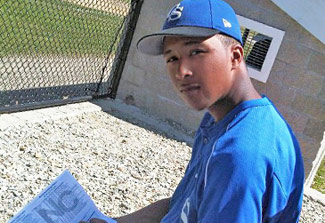
When he needed to develop a marketing plan for the team, he sought out Business Administration Assistant Professor Bill Spear, who teaches marketing, for advice. As they met for the first time, Professor Spear became enthusiastic about Cameron's work and spent more than two hours showing him how to put the plan together.
Cameron is proud of his role as a Progressive Scholar in raising funds for the people of Haiti and bringing more diversity to the college. His interest in Communication Studies stems in part from his participation in the struggles among the scholars over how to structure their program and organize their events. “All of us are leaders and we really head-butted a lot,” he says. “We're all outspoken and will need to find better ways to communicate.”
Next, Cameron wants to get more involved in helping others like him make it into college. “As someone who's made it to college without anyone guiding me, it's important to me to make it a lot easier for other inner city kids,” he says.
Change Is Coming
This fall the Progressive Scholars program will enter its third year with new students enrolled from Boston, Chicago, New York City and the San Francisco area. This year Admissions received twice as many applications for the program as they had spaces for students.
The first two classes of scholars can take pride in the program's evolution and in their personal growth as individuals. Through their Voices of CSC concerts and Black History Month performance, the scholars have shared their talents and rich cultures and history, and next year they hope to continue events like these on campus and in area communities.
In the classroom and in their activities, residence halls and everyday interactions on campus, these students are adding their voices to the dialogue, bringing unique perspectives shaped by their urban experiences, diverse family histories and the rich multicultural communities in which they have lived.
Colleges are, in essence, learning communities in Vice President Matthews' view, and he believes it's vital that these environments reflect many diverse perspectives from across the country and world. In defining diversity broadly in terms of ethnicity, geography, race and socioeconomic status, he says, “Colby-Sawyer benefits from having students with many different backgrounds and perspectives which provide our students with more interactive and interesting classroom and residential experiences and prepares them to thrive in a global society.”
In educating our students about other cultures, we're also leading them toward a deeper understanding of themselves, of how they view the world and their place within it, according to Jen Jacques. And with knowledge and understanding, people are more apt to appreciate, respect and celebrate their own and other cultures and perspectives.
With the diversity of this past year's class rising to about 15 percent, Jen says the campus is already changing. “If you're from rural Maine and you're sitting in class next to a student from Chicago and another student from Nepal is sitting behind you, and you're having a discussion about religion, the perspectives are very different,” she says. “All of a sudden you hear something and think, wow, I've never thought of it in that way. You may not know until later, but it may change you in some way. That's what education is all about.”
Progressive Scholar Bernadine Bernard will return to campus as a junior in September. In two years she has seen a steady increase in diversity on campus through new students in her program, a growing number of international students, and changes in the general student body. “We're beginning to blend in with everyone else as the school gets more diverse,” she says. “People are not just seeing our color so much anymore. They're seeing us as individuals.”


